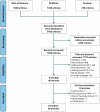Iatrogenic withdrawal syndrome in adult intensive care unit: a scoping review
- PMID: 40771468
- PMCID: PMC12325356
- DOI: 10.3389/fmed.2025.1573363
Iatrogenic withdrawal syndrome in adult intensive care unit: a scoping review
Abstract
Introduction: Following prolonged opioid and/or hypnotic exposure, iatrogenic withdrawal syndrome (IWS) can develop in critically ill patients due to improper cessation of these drugs. While IWS is well-documented in pediatric and neonatal intensive care unit (ICU), research on adult ICU patients remains scarce. This scoping review aimed to map existing evidence on IWS in critically ill adults, focusing on diagnosis, epidemiology, risk factors, complications, clinical effects, treatment, and prevention.
Methods: A literature search across PubMed, Scopus, and Web of Science included studies from 1990 to 2024 with prospective, retrospective, or randomized controlled trial designs. Out of 3105 retrieved titles, 29 studies met inclusion criteria.
Results: Most studies addressed diagnosis (83%) and epidemiology (79%), with IWS definitions largely adapted from chronic drug users. Incidence varied from 13.6 to 49.5%. Several studies identified risk factors, primarily therapy-related, but only some performed robust statistical analyses. Complications and clinical effects were discussed in 12 studies but results on ICU and hospital outcomes were inconsistent. Physiological studies linked IWS to sympathetic overactivity and central nervous system excitability. Only 20% of studies examined treatment or prevention, with randomized trials assessing substitution therapy. Most strategies did not significantly alter IWS incidence, though clonidine showed potential benefits.
Discussion: This review highlights critical knowledge gaps and the lack of consensus or guidelines for IWS in adult ICU patients, emphasizing the need for further research.
Keywords: benzodiazepine; clonidine; dexmedet- omidine; hypnotics; iatrogenic withdrawal syndrome; opioid; sedation.
Copyright © 2025 Moisa, Tuculeanu, Corneci, Negoita and Bilotta.
Conflict of interest statement
The authors declare that the research was conducted in the absence of any commercial or financial relationships that could be construed as a potential conflict of interest. FB declared that they were an editorial board member of Frontiers, at the time of submission. This had no impact on the peer review process and the final decision.
Similar articles
-
Early intervention (mobilization or active exercise) for critically ill adults in the intensive care unit.Cochrane Database Syst Rev. 2018 Mar 27;3(3):CD010754. doi: 10.1002/14651858.CD010754.pub2. Cochrane Database Syst Rev. 2018. PMID: 29582429 Free PMC article.
-
Single induction dose of etomidate versus other induction agents for endotracheal intubation in critically ill patients.Cochrane Database Syst Rev. 2015 Jan 8;1(1):CD010225. doi: 10.1002/14651858.CD010225.pub2. Cochrane Database Syst Rev. 2015. PMID: 25568981 Free PMC article.
-
The effectiveness of interventions to meet family needs of critically ill patients in an adult intensive care unit: a systematic review update.JBI Database System Rev Implement Rep. 2016 Mar;14(3):181-234. doi: 10.11124/JBISRIR-2016-2477. JBI Database System Rev Implement Rep. 2016. PMID: 27532144
-
Opioid antagonists with minimal sedation for opioid withdrawal.Cochrane Database Syst Rev. 2017 May 29;5(5):CD002021. doi: 10.1002/14651858.CD002021.pub4. Cochrane Database Syst Rev. 2017. PMID: 28553701 Free PMC article.
-
Impact of Nurse-Driven Analgesia and Sedation Protocols on Medication Exposure and Withdrawal in Critically Ill Children: A Systematic Review.Nurs Crit Care. 2025 May;30(3):e70051. doi: 10.1111/nicc.70051. Nurs Crit Care. 2025. PMID: 40438004 Free PMC article. Review.
References
-
- Ries Richard, Miller SC, Saitz Richard, Fiellin DA. The ASAM principles of addiction medicine. Philadelphia, PA: Lippincott Williams and Wilkins; (2015).
-
- MacDonald I, Alvarado S, Marston M, Gomez Tovar L, Chanez V, Favre E, et al. A systematic review of clinical practice guidelines and recommendations for the management of pain, sedation, delirium and iatrogenic withdrawal syndrome in pediatric intensive care. Front Pediatr. (2023) 11:4717. 10.3389/FPED.2023.1264717 - DOI - PMC - PubMed
Publication types
LinkOut - more resources
Full Text Sources
Miscellaneous


